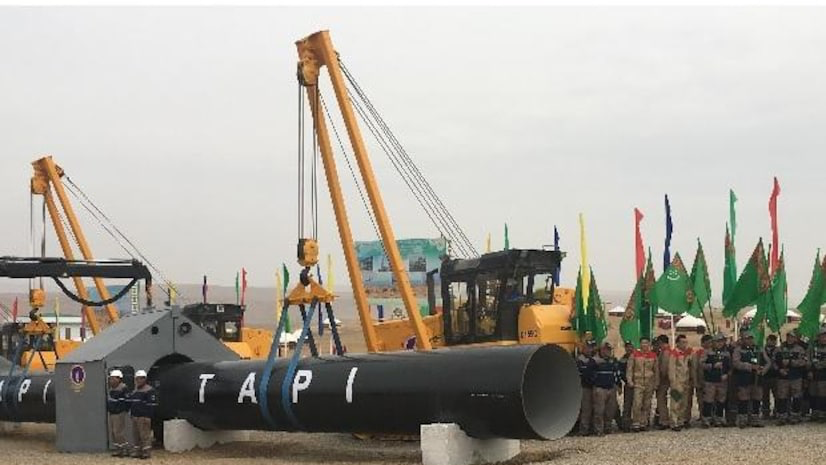
Disclaimer: Copyright infringement not intended.
Context
- Signing of a Joint Implementation Plan (JIP) between Pakistan and Turkmenistan for the TAPI (Turkmenistan-Afghanistan-Pakistan-India) gas pipeline project
Details
Signing of the Joint Implementation Plan (JIP):
- Pakistan and Turkmenistan signed a Joint Implementation Plan (JIP) for the TAPI gas pipeline project.
- The JIP was signed by State Minister and Head of TurkmenGaz, Maksat Babayev, and Minister of State for Petroleum, Dr. Musadik Malik.
- Pakistan Prime Minister Shehbaz Sharif, key cabinet members, and representatives from the Petroleum Division and Inter State Gas Systems Pvt Ltd attended the signing event.
- A high-ranking Turkmenistan team led by Babayev, Deputy Minister of Energy Annageldi Saparov, and CEO and Chairman of BOD, TPCL, Muhammetmyrat Amanov, inked the agreement.
Objectives of the JIP:
- The JIP aims to expedite and oversee the project activities for the TAPI gas pipeline.
- It envisions the constitution of a Senior Coordination Committee (SCC) to ensure smooth implementation.
Pakistan's Vision and Commitment:
- Pakistan Prime Minister Shehbaz Sharif highlighted the significance of the TAPI gas pipeline project as a critical component of his government's vision.
- The project is expected to ensure energy security, economic growth, and prosperity for Pakistan and the entire region.
- Shehbaz Sharif emphasized the strategic cooperation between Pakistan and Turkmenistan in the energy sector.
Focal Person and Senior Coordination Committee:
- Special Assistant to PM, Jehanzeb Khan, was nominated as the focal person from Pakistan's side to head the Senior Coordination Committee (SCC).
Strengthening Economic and Commercial Relations:
- PM Shehbaz emphasized the brotherly relations between Pakistan and Turkmenistan based on common history, culture, and religion.
- Both countries expressed a keen desire to further promote economic and commercial relations.
- Pakistan offered Turkmenistan the opportunity to explore gas connectivity from the Chaman border to Gwadar and to build LNG terminals at Gwadar, expanding supplies to Europe and global LNG markets.
Overview of the TAPI Gas Pipeline Project:
- The TAPI gas pipeline project aims to transport natural gas from the Galkynysh gas field in Turkmenistan to Pakistan through Afghanistan.
- The pipeline will have a capacity to transport up to 33 billion cubic meters (bcm) (average 3.2 BCFD) of natural gas per year over a 30-year period.
- Pakistan's off-take will be 1.3 BCFD with a pipeline diameter of 56 inches.
- The proposed route includes Herat, Kandahar, Chaman, Zhob, DG Khan, Multan, and Fazilika, with a pipeline length of 1,849 kilometers.
Positive Interactions and Future Prospects:
- The engagements between the Turkmen delegation and Pakistan were characterized by mutual goodwill, understanding, cooperation, and amity.
- The Turkmen delegation expressed gratitude for the traditional hospitality extended by Pakistan and remained optimistic about expanding bilateral ties.
- The TAPI project is expected to enhance Pakistan's energy security, make its industrial sector competitive, and create employment opportunities for the youth.
Importance of the TAPI Gas Pipeline Project:
- Pakistan considers the TAPI gas pipeline project crucial in meeting emerging energy challenges and fostering meaningful commercial and energy cooperation with Central Asia.
Importance of Turkmenistan's Gas Reserves:
- Turkmenistan possesses vast gas reserves, including the Galkynysh gas field, making it an essential energy supplier for the region.
- The TAPI gas pipeline project allows Turkmenistan to unlock the potential of its gas resources and expand its export markets.
Challenges and Mitigation Measures:
- The project faces challenges related to security, political stability, and financing.
- Robust security measures and regional cooperation efforts are implemented to ensure the safety of the pipeline.
- Strong political commitment and cooperation among participating countries are vital for overcoming challenges.
Environmental Considerations:
- The TAPI gas pipeline project adheres to environmental standards and regulations.
- Measures are taken to minimize the environmental impact during the construction and operation phases.
|
PRACTICE QUESTION
Q) The TAPI gas pipeline holds great significance for regional cooperation and energy security in South Asia. Discuss the key features and potential benefits of the TAPI pipeline project, and highlight the challenges that need to be addressed for its successful implementation. (150 words)
|

https://www.business-standard.com/world-news/pakistan-turkmenistan-ink-joint-implementation-plan-for-tapi-gas-pipeline-123060900063_1.html




